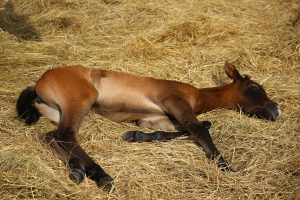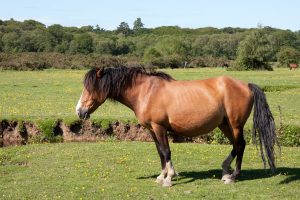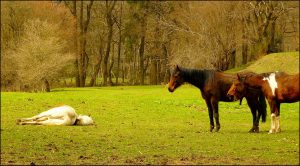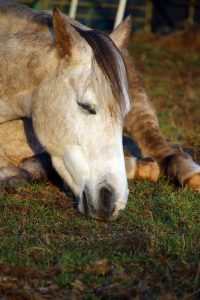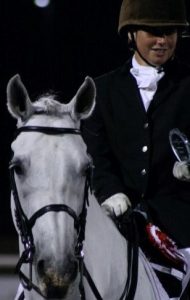There can’t be many owners who haven’t gone into a state of panic when seeing their beloved horse lying on its side with his eyes closed. Nervously, they call their horse’s name and run anxiously towards him, fearing the worst. The horse lifts his head and reluctantly gets up, looking annoyed at this crazy human being who has disturbed him for no apparent reason! Sound familiar?
It is most likely there was absolutely nothing wrong with the horse, and he was just fast asleep, enjoying a lovely dream!
Many people believe that horses sleep standing up. Although this is partially true, much of an equine’s most important sleep is acquired when lying down.
Horse sleeping patterns are typical of a prey animal. Compared to human beings, equines do not need very much actual sleeping time and usually sleep for short periods throughout the day and night. The reason for this is that they are extremely vulnerable to predators and they must be ready to flee at any moment.
Types of Sleep
Equine sleep is something that people do not tend to think about, especially as there are very few studies regarding this subject. However, it is vital that we understand our horse’s sleeping patterns, as any changes in their usual behaviour could be early indications of health problems.
Equine sleeping habits largely depend on whether they are wild, stabled, or living out at pasture.
There are four stages of the wake/sleep cycle in horses:
- Wakefulness – During this stage, the horse is completely conscious, spending much of its day eating. In the wild, they go in search of food, often travelling great distances, whereas domestic horses are typically ridden or at pasture.
- Drowsiness (DR) – Most domesticated horses are stabled inside for long periods, so they relieve their boredom by dozing. The sight is familiar to owners; drooping head and neck, floppy lips, relaxed ears, eyes closed and often standing on three legs, with one hind leg resting. The horse remains in this position because of his ability to lock his knees and stifles, known as “stay apparatus.” The resting hind leg enables him to kick out at any potential predators instantly.
- Slow Wave Sleep (SWS) – In this stage, the brain is not at its most functioning level and is effectively “sleeping.” The horse must go through Slow Wave Sleep before reaching the deeper REM sleep. The horse can stay standing or rest in sternal recumbency, whereby he lays down with his legs tucked under and the head and neck remaining upright.
- Rapid Eye Movement (REM) – As the name suggests, REM sleep consists of rapid eye movement and is also known as ‘paradoxical sleep.’ The mind is almost as active as it is during wakefulness and usually dreaming occurs. To achieve this type of sleep, the horse must be lying down, due to the loss of muscle tone at this stage, and preferably flat out if there is sufficient space.
The benefits of quality sleep
Good sleeping patterns allow the horse to function and perform properly. During Slow Wave Sleep (SWS) the brain is resting and in REM sleep the muscles rest.
Equines that are fed regularly throughout the day are more likely to enjoy quality sleep compared to those that only receive their feeds twice a day.
REM sleep affects the horse’s attention during wakefulness. Lack of REM causes the horse to either overreact to situations, becoming extremely alert and difficult to handle or appears lethargic and lazy.
How long do horses sleep?
Where humans typically sleep for about eight hours in one long, uninterrupted stretch, horse’s sleeping habits are polyphasic, meaning they sleep multiple times throughout the day and night.
The average equine usually sleeps from two to four hours over a 24-hour period. Much of that time is spent dozing and approximately two hours are in Slow Wave Sleep (SWS), split into four or five sessions, with wakefulness and REM happening in-between stages. Foals, like any young human or animal, will sleep longer than an adult.
An adult horse spends 45 minutes in REM sleep, occurring in short bursts of up to twenty minutes at a time. To engage in REM, a horse must feel safe in his environment and have a suitable place to lie down.
Equines are unable to lie down for very long as they risk suffering from reperfusion injury. Because horses are such large animals, when they do lie down, blood flow is restricted to certain areas, causing problems as they attempt to stand up again.
The herd instinct
In the wild, a group of horses will use the buddy system where one is on lookout duty, known as the sentinel, while the others sleep. All members of the herd take turns, and this method is also adapted to suit the domesticated, stabled horse and his neighbours.
Sleep disorders in horses
Sleep deprivation
Horses can go several days without REM sleep before you start to notice the effects. There are a variety of reasons why your horse is not sleeping:
Change in environment – Moving to a new barn or sleeping overnight at a showground for a competition can have a profound effect on horses. Many will have little or no sleep until they settle into their new surroundings.
Physical – Often if a horse is in pain, especially in the limbs, they may be physically unable to lie down. Older horses, especially, may find it difficult due to conditions such as osteoarthritis.
Isolation – A horse kept alone is likely to be stressed and would have no sentinel to keep guard making him feel vulnerable.
An unsuitable place to lay – Reasons maybe a lack of bedding, too small an area in the stable or wet and muddy conditions if kept out at pasture.
Noisy location – If your barn is located near to a busy road or there is another noisy activity going on, it may cause disturbance to your horse
Feeling unsafe in outdoor environment – There may be wild animals around that make your horse feel insecure and exposed to danger.
Social situation – If your horse is new to a herd or there is an aggressive horse, he may be reluctant to lie down.
Symptoms
If you think your horse is suffering from sleep deprivation, he may display the following symptoms:
- Your horse may not be lying down at all. Tell-tale signs are if you never see bits of bedding or dirt on the body or mane and tail, or your horse doesn’t appear to roll.
- Performance is affected.
- The horse seems drowsy.
- Drifts off into a deep sleep while standing, causing the horse to buckle at the knees due to the muscles relaxing. Usually, they will wake up abruptly as they start to fall. Signs this may have occurred are bruises and grazes on his knees.
Treatment
Once you work out the cause of your horse’s sleep deprivation, you can take measures to treat it and get your horse some much-needed shut-eye.
Moving your horse away from an aggressive equine or noisy environment, or keeping him with others if he is isolated, will help matters. Make sure his stable is big enough for him to lie down in with good bedding.
If he is living out at pasture, ensure there is somewhere dry for him to rest or bring him inside when the weather is bad.
If it is a physical pain or another medical issue that is making him reluctant to lie down, then your veterinary should be consulted.
Your horse may find it stressful travelling to shows and staying overnight, which will affect the quality of his sleep. It may be worth going on the actual day of the competition, so he has benefited from sleeping at home.
Hypersomnia (Sleeping excessively)
As horses only sleep for a few hours, any horse that wants to sleep continuously is a significant cause for concern.
Reasons could be that your horse is depressed, lacks stimulation, is isolated or suffering from a neurological or infectious disease.
If your horse is sleeping excessively, you should consult your veterinarian.
Final thoughts
It is vital that your horse has the amount of sleep he requires to repair and restore his mental and physical systems. Having good, quality sleep will ensure a good performance from your horse, and he will be much happier and easier to handle as a result.
Alison O’Callaghan, our Equine Editor, is a professional horse riding instructor and has owned many types of pets. When she is not riding horses or walking her dog, she loves to write about animals. If you’d like to contact Alison, you can email her at ocallaghan462@gmail.com.

